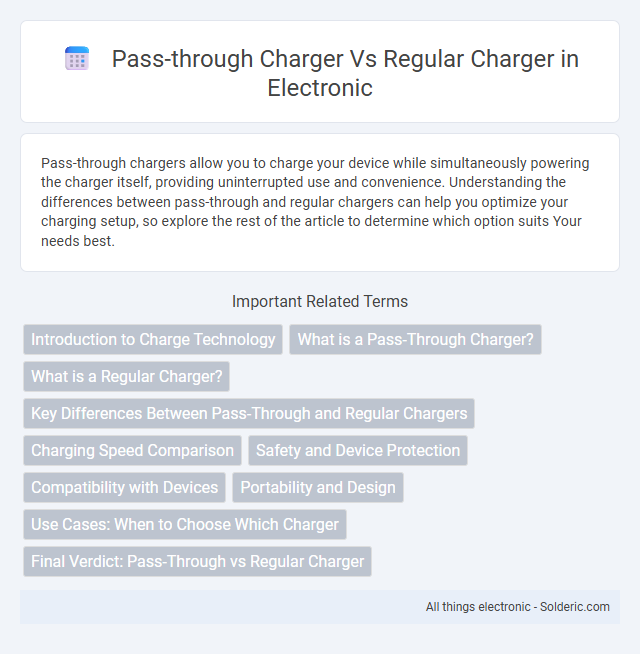Pass-through chargers allow you to charge your device while simultaneously powering the charger itself, providing uninterrupted use and convenience. Understanding the differences between pass-through and regular chargers can help you optimize your charging setup, so explore the rest of the article to determine which option suits Your needs best.
Comparison Table
| Feature | Pass-through Charger | Regular Charger |
|---|---|---|
| Charging Method | Charges device while simultaneously charging its own battery | Charges device only; external power required for battery recharge |
| Power Efficiency | Moderate; some power loss during pass-through | Higher; direct power to device |
| Use Case | Ideal for continuous device use without interruption | Best for standard, single-purpose charging |
| Charging Speed | Usually slower due to shared power | Faster, focused on device charging |
| Device Compatibility | Compatible with most USB-powered devices with pass-through support | Compatible with all standard charging devices |
| Price | Generally higher due to advanced circuitry | Lower, basic charging technology |
Introduction to Charge Technology
Pass-through chargers combine the ability to charge a device while simultaneously powering another, eliminating downtime and allowing continuous use. Regular chargers provide direct, single-device charging without the capability to power additional devices during the process. Your choice between these technologies depends on the need for seamless power delivery and device usage during charging sessions.
What is a Pass-Through Charger?
A pass-through charger is a device that allows simultaneous charging of a battery and powering of connected devices. Unlike regular chargers that only charge a battery, pass-through chargers enable continuous power flow, making them ideal for vaping devices or portable electronics used while charging. This functionality prevents interruption in usage by supplying power directly from the charger and maintaining battery charge simultaneously.
What is a Regular Charger?
A regular charger directly powers your device by converting AC electricity from a wall outlet to DC electricity suitable for charging, without storing energy. It typically delivers a consistent current and voltage, ensuring your gadget charges steadily while plugged in. Unlike pass-through chargers, regular chargers do not allow simultaneous charging of an external device while the internal battery charges.
Key Differences Between Pass-Through and Regular Chargers
Pass-through chargers allow you to charge your device while simultaneously powering it, preventing battery drain during use, unlike regular chargers that only charge without powering the device concurrently. Regular chargers are simpler, delivering power directly to the battery, which might result in slower charging if the device is in use. Your choice depends on whether continuous device operation during charging is essential for your needs.
Charging Speed Comparison
Pass-through chargers allow your device to charge while simultaneously powering other accessories without significant speed loss, providing efficient energy distribution. Regular chargers typically offer faster direct charging speeds since all power is dedicated solely to the device. For optimal charging speed, your choice depends on whether you prioritize multitasking convenience or maximum energy output to your device.
Safety and Device Protection
Pass-through chargers offer enhanced safety by allowing your device to charge while simultaneously powering other devices without interrupting the power flow, reducing the risk of power surges and overheating. Regular chargers lack this feature and may increase the chances of battery degradation or device damage due to inconsistent power delivery. Choosing a pass-through charger can provide better device protection by maintaining stable charging conditions and ensuring long-term battery health.
Compatibility with Devices
Pass-through chargers provide simultaneous charging and device use without interrupting power flow, making them highly compatible with laptops, tablets, and smartphones that require continuous operation. Regular chargers deliver power directly to your device but may disconnect once battery is full, limiting use during charging for some electronics. Your choice between pass-through and regular chargers depends on the need for uninterrupted device functionality and the specific power requirements of your gadgets.
Portability and Design
Pass-through chargers offer enhanced portability by allowing devices to charge while simultaneously powering other electronics, reducing cable clutter and minimizing the need for multiple outlets. Their compact and integrated design often includes multiple ports, making them ideal for travel and on-the-go use compared to regular chargers that typically provide a single output. Regular chargers prioritize simplicity and low cost but lack the multifunctional convenience and space-saving benefits of pass-through models.
Use Cases: When to Choose Which Charger
Pass-through chargers are ideal for users who need to charge their device while simultaneously using it, such as during extended gaming sessions or live streaming. Regular chargers are better suited for quick, stationary charging when device use is minimal or not required during the charging process. Choosing between the two depends on whether continuous device operation during charging is a priority or if fast, unattended charging is the main goal.
Final Verdict: Pass-Through vs Regular Charger
Pass-through chargers enable simultaneous device charging and battery pack recharging, offering convenience for uninterrupted power supply during travel or extended use. Regular chargers typically require the power bank to be fully charged before use, limiting continuous device operation. For users prioritizing on-the-go efficiency and minimal downtime, pass-through chargers present a superior solution compared to standard charging methods.
Pass-through charger vs Regular charger Infographic

 solderic.com
solderic.com